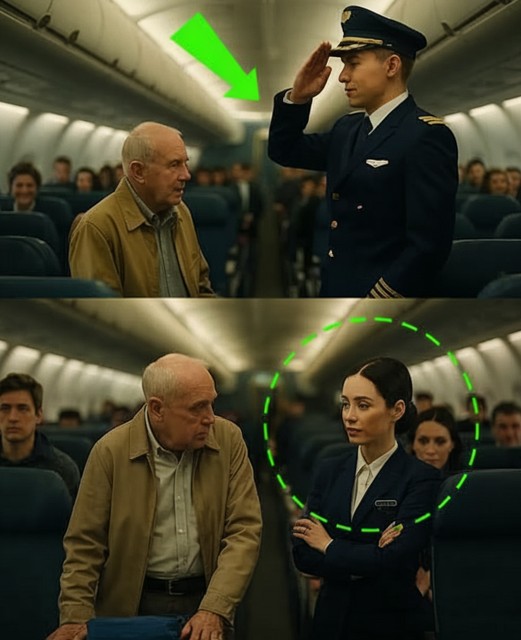At 78 years old, Frank Delaney boarded a flight from Denver to Annapolis with quiet determination. A retired Staff Sergeant in the U.S. Marine Corps, Frank had carefully chosen seat 14C for its extra legroom—a crucial detail for someone dealing with an injured knee that made sitting for long periods especially painful.

He didn’t expect special treatment, just a bit of comfort for the journey ahead. But just before takeoff, a young flight attendant named Kayla approached him with a request that caught him off guard. A family wanted to sit together and needed his seat. Calmly and respectfully, Frank explained that he had a medical condition and specifically selected that seat for his knee. However, the tension in the cabin began to build as the delay grew longer. Other passengers sighed, exchanged glances, and whispered under their breath.
Despite his valid explanation, the subtle pressure from those around him became harder to ignore. Wanting to avoid further conflict or delay, Frank quietly rose from his seat. He briefly identified himself as a retired Marine and made his way to the cramped middle seat in row 32 without complaint. The space was tight, his knee began to throb immediately, and the discomfort was both physical and emotional. He sat in silence, invisible to those around him, his sacrifice going unnoticed and unappreciated. But not everyone missed it. A woman named Charlotte Hayes, seated a few rows ahead, had been watching.
She saw the entire exchange and quietly sent a message to someone she knew at the airline. While Frank endured his pain in silence, another veteran—Captain David Miller, the pilot—received the message up front. The name Frank Delaney triggered a memory. Without hesitation, Captain Miller left the cockpit, walked down the aisle of the aircraft, and approached Frank. In front of the entire cabin, he saluted the elderly Marine and thanked him for his service. Then, in a powerful and deeply respectful gesture, he escorted Frank to seat 1A in first class. The atmosphere in the cabin changed instantly.
The awkward silence was replaced with admiration. Some passengers stood and applauded. Others were moved to tears. One man, who had once served under Frank’s command, stood up and wept openly, recounting how Frank had saved his life many years ago. It was a moment that no one on that flight would forget. Captain Miller then turned to the passengers and said, “We don’t leave our own behind. Not in combat. Not at 30,000 feet.” The words echoed through the cabin, a powerful reminder of the values that bind those who serve. When the plane landed, the airline didn’t just offer a verbal apology.
Frank’s ticket was fully refunded, and he was given lifetime priority boarding status. A few days later, news of the incident reached the right ears, and a commendation that had been long overdue—one that Frank had earned years ago but had somehow been forgotten—was officially reinstated by the Army. Frank had never asked for recognition. He didn’t seek applause or attention. He had lived his life with quiet honor and humility. But for once, the world stopped and looked. It acknowledged his sacrifice, his service, and his humanity. And in doing so, it gave back a piece of dignity that had momentarily been taken away.
In the days that followed, Frank walked a little taller. Not from pride or ego, but from the simple reassurance that he had been seen, that what he gave had mattered, and that even in a crowded plane among strangers, there are still people who remember what it means to honor those who served.





